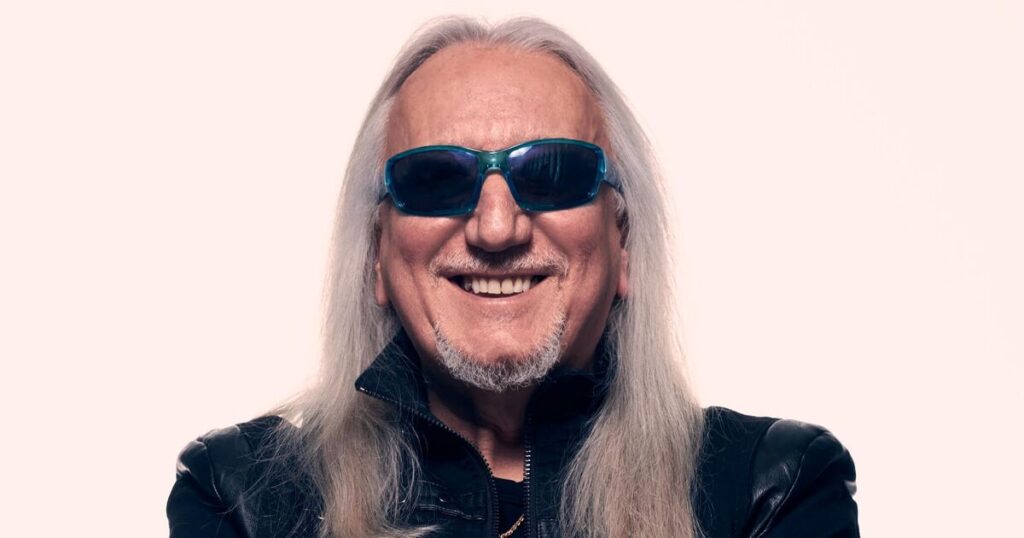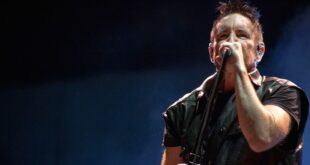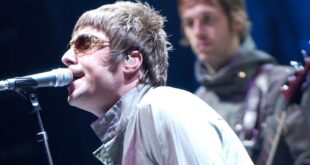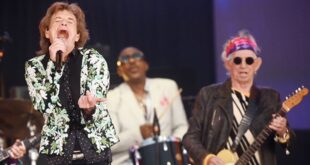

‘Appy Days! Cockney guitar wizard Mick Box at 77 (Image: Richard Stow)
The bullet that smashed through Lee Kerslake’s Detroit hotel window wasn’t meant for the Uriah Heep drummer. The jealous gunman had intended to shoot Ken Hensley, the band’s keyboardist and rhythm guitarist.
“We were told he was out to kill Ken because his girlfriend fancied him,” lead guitarist Mick Box says. “But there was nothing going on. The police found the bullet; they never found the geezer.”
Heep played that night’s show at the 12,000-seater Cobo Arena, “But we moved a bit faster than normal,” the cheery Cockney tells me. “After that, we got bodyguards in from a karate school. They were all black belts, ex-police. Really tough.”
The London-based rockers had four received murder threats on previous US tours, and a man had leapt over the barrier and attempted to stab singer David Byron on stage with a stiletto in Kentucky.
“Luckily Lee saw it happening. He was a dab hand with his drumstick and he threw one so hard it knocked him off balance long enough for the guys to grab him,” says Mick, 77, who is widely regarded as the nicest man in rock.
Sometimes the pain was self-inflicted, though. Take the first night of Heep’s 1975 US tour.
“Rod Stewart had started having white carpets on stage, so we decided to have black carpets,” Mick recalls. “I had to come out first and play an opening riff. But I hadn’t asked the crew to mark the end of the carpet, so I ran out and shot straight off the stage like Roadrunner from the cartoon! I fell six foot into the orchestra pit and dislocated my arm.”
By the time they found a doctor to crack his bone into place, he’d already consulted “my favourite doctor – Dr Remy Martin”.
The Louisville Gardens stadium in Louisville, Kentucky, was packed that night and they went down a storm. “At the end, everyone had forgotten I’d hurt my arm and when we lined to take a bow, someone gripped me. I yelped in agony. Worse, there were these big black balloons on stage and I decided to kick one off, and fell in the pit again.
“This time I broke three bones in my right wrist. Fans got to the hospital and as I was sitting waiting to be seen by the specialist, I’d see ’em walking past the door saying ‘You all right, Mick?’ Eventually the specialist turned up and put everything back into place but by then I had a hangover, courtesy Dr Remy…”
The next night Mick was in so much agony he was given powerful pain-killing injections. “They sent me into the cosmos,” he laughs. “I needed two casts a day for the entire tour. I must have seen the inside of half the hospitals in America.”
Born in Walthamstow, East London, Box is the only surviving original member of Uriah Heep. Since they released their debut LP, …Very ’Eavy…Very ’Umble… in June, 1970, introducing their symphonic heavy rock to the world, the band have sold more than 40million albums worldwide – and that’s not including the bootlegs.
An only child, Mick’s father passed away when he was just seven. “He had a heart attack on Christmas Day and died on Boxing Day,” he says, momentarily sombre. That left just him and his mother, who got a job working for Eveready Batteries.
Growing up, Box listened to Django Reinhardt, Buddy Holly, Eddie Cochran, Hank Marvin, The Who and The Move. At 14, he had weekly lessons from a jazz guitar teacher for six months and launched his first band, The Stalkers.
“I wasn’t long out of short trousers – I was the last one at school to wear ’em because mum couldn’t afford long trousers. We only played 12-bar blues but a lot of those songs ended up in our Rock ‘n’ Roll Medley on our first live album” – 1973’s Uriah Heep Live.
Leaving school at 15, Mick worked for an export company near Liverpool Street. “I took the job to pay for the guitar but I couldn’t stand smoking on the train, so I cycled 10 miles into town every day – which helped me pay off the guitar quicker.”
His first pro band, Spice morphed into Uriah Heep in 1969, although Heep’s first gig at London’s imperial College nearly finished them off.
“One of our crew suggested we should have a bit of everybody else’s sound in the speakers behind us, so you couldn’t hear your own sound. It was such a mess we almost packed it in. A proper cacophony.
“Getting a residency at the Marquee was our first big moment, after that the work doubled.”
Very ’Eavy attracted a different breed of snipers from the Detroit marksman – rock critics.
“We came after Led Zeppelin, Black Sabbath and Deep Purple and I think the feeling was, ‘Oh no not another one’. One reviewer in America wrote that if Uriah Heep were successful, she’d commit suicide… We’re still waiting to find out if that happened.”
Their early prog-rock elements also saw them written off, bizarrely, as ‘a third-rate Jethro Tull’. “None of us could stand up on one leg for that long,” Mick laughs.
1972 album Demons And Wizards broke them big. “The second single, Easy Livin’ took us onto the world stage,” he says.
Heep initially toured America supported by Earth, Wind And Fire and ZZ Top, “so we weren’t playing to the converted, all that mattered with those audiences was how good you were.
“It was fantastic, mate, I was 23, playing guitar, having it large. How could I play the blues now?”
The band went Top Ten with 1975’s Return To Fantasy; their fourteenth album, 1982’s Abominog rebooted their US success. Their second single from it, That’s The Way That It Is, enjoyed heavy rotation on MTV. Tours supporting Def Leppard followed. But unlike Leppard, Heep weren’t groupie magnets.
“Leppard had women climbing through their hotel windows, we had women climbing out of ours,” laughs happily-married father-of-one Mick.
He is currently writing his autobiography – “a nightmare because there were so many lineups, so many tours, so many countries…”
Even the Soviet Union. They played the Eastern Bloc regularly in the 80s, Czechoslovakia, Bulgaria, Yugoslavia, East Germany – “Our motto was, if people can’t come out for the music we’ll take the music to the people. We didn’t want to just play safe. Our Hungarian promoter, Laszlo, kept saying ‘You’ve got to play Russia, you don’t know how big you are there’.”
In 1987, thanks to Glasnost, they became the first Western rock band to play Moscow, performing to 180,000 over ten days at the Luzhniki Stadium, the largest football stadium in Russia.
“It was momentous,” he says. “People in the crowd were crying; the songs meant such a lot to them. It them cost two months wages to buy our album, but it was the only joy they had. We’d walk into restaurants, and people would stand up and applaud. It was mind-blowing.”
The KGB were everywhere. “You couldn’t phone home without someone clicking in. We were followed everywhere and we were watched everywhere. We had no problems, because we played the game, but at the gigs the crowd were kept 30 metres from the front of the stage with soldiers standing with rifles on their shoulders, looking at them not us.
“We used to run out to break the ice and try and shake their hands to lighten it up. By the end the soldiers were watching the show.”
One afternoon Heep asked their bus-drivers to go out and round up fans from the street and bring them back to their soundcheck for free. “It lasted longer than the set,” he says. “And they were able to get right in front of the stage.”
Badly-made Heep bootlegs flourished across Eastern Europe. “There were literally hundreds of them, poor quality but they sold in their thousands. So we put out our own official bootlegs – decent recordings with decent sound – but it didn’t stop.”
In 2008, Heep performed inside a prison in Rotenberg, Germany. “I said to the warden maybe we shouldn’t play Stealing or Free Me but he said go ahead, so I changed the words ‘free me from your spell’ to ‘Free me from your cell’. That went down well.”
Both Ken and Lee died in 2020. David Byron passed in 1985 aged 38, and was replaced by Canadian Bernie Shaw, still fronting Uriah Heep at 68. The current line-up is Mick, Bernie, bassist Davey Rimmer, drummer Russell Gilbrook and keyboardist Phil Lanzon.
Covid stopped them gigging for two years but Mick kept busy doing lockdown diaries and ‘Ask Mick’ videos. They wrote 2023’s defiantly upbeat studio album Chaos & Colour over Zoom.
This year’s The Magician’s Farewell Tour is short, though, with just seven UK dates this month, followed by dates in South America and Japan.
“We’ve cut back from 200 shows a year to sixty, but we won’t stop,” says Mick. “You’ve got to keep going, mate, haven’t you? ’Appy days!”
*Uriah Heep’s The Magician’s Farewell Tour runs from February 19 – 27. Tickets from uriah-heep.com
 Latest World Breaking News Online News Portal
Latest World Breaking News Online News Portal






